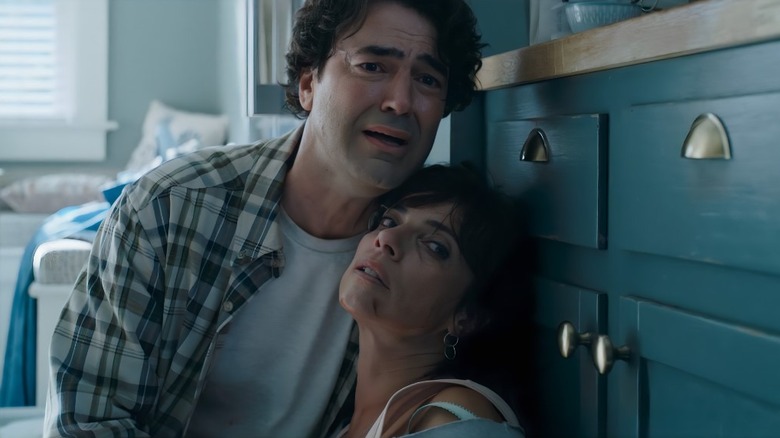The Flash: The Dark Meaning Behind Barry And His Mom's Song
Music and score play a big part in storytelling, as they offer depth to the narrative and allow filmmakers to trim unneeded dialogue that would otherwise feel superfluous. In "The Flash," the bond between mother and son is established with Nora and Barry dancing in the kitchen to "Pedro Navaja," a Spanish-language song performed by Rubén Blades that displays the Latin culture of the characters. Andy Muschietti, however, didn't pick just any salsa song; he chose one with a dark meaning for Nora. And maybe even a dark foreshadowing for Barry as well.
The song's lyrics tell a story of the song's namesake — a criminal walking the street holding a knife in search of a victim. When he sees a woman, he attacks her with the knife, but she is also armed with a gun and shoots him. After that, a homeless man happens upon them and takes the gun, the knife, and two dollars before skipping away and singing, "Surprises life throws at you."
Nora sings those lyrics while dancing with Barry, foreshadowing her own death before she is stabbed by an unseen intruder. Not only does the song give a hint at Nora's fate, but it also gives a hint at Barry's. Similar to how the criminal suffered as a result of his selfish pursuits, Barry's selfish attempt to save his mother and avoid grief caused pain and suffering for everyone. And the song shows how important it was to Muschietti to include Latin culture in the film.
The Flash is a love song to the Latin community
Director Andy Muschietti's "The Flash" is more than just a retelling of one of the most classic storylines from the Scarlet Speedster's comics, "Flashpoint." It is also a love letter to Argentina and many other Latin cultures. Along with Colombian actress Sasha Calle playing Supergirl and Spanish actress Maribel Verdú playing Nora Allen, the famous salsa song adds another layer to the film's connection to the Latin community.
Muschietti commented to NBC News that it was essential to many people that he and his sister, producer Barbara Muschietti, helmed this project. "We explored the multiverse because we think there are so many more ideas to be told honoring the characters from the past and the characters from the future," Barbara Muschietti said. Their comments show that the multiverse can feature other, more diverse characters in different worlds.
The approach of "The Flash" in using the multiverse as an opportunity to create some diversity in the casting may have intentionally or unintentionally opened a door for James Gunn's Elseworlds projects to have carte blanche in casting minorities and people of color in roles that have always been white in the comics. While there will always be comic book purists who will criticize the idea, "The Flash" shows how changing a white character's origins to a different background will not alter the storyline or hero's role negatively.

